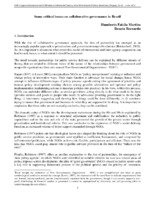Some critical issues on collaborative governance in Brazil
Fecha
2013Autor
Martins, Humberto Falcão
Bernardo, Renata
Metadatos
Mostrar el registro completo del ítemResumen
With the rise of collaborative governance approach, the idea of partnership has emerged as an increasingly popular approach to privatization and government-nonprofit relations (Brinkerhoff, 2002). So, it is important to discuss to what extent this model of intersectoral and inter-agency cooperation can lead to and, hence, to what extent it should be promoted. The trend towards partnerships for public service delivery can be explained by different strands of theory, that are related to different views of the nature of the relationships between government and nonprofit organizations (here also named Non Governmental Organizations NGO. Following this brief literature review, to shed light on the debate, this paper aims at identifying issues that are critical to the satisfactory development of these arrangements in the Brazilian experience, such as: institutional strength of the collaboration entity, quality of the selection, balance between control of means and ends, position of the control bodies, and results-orientation.


